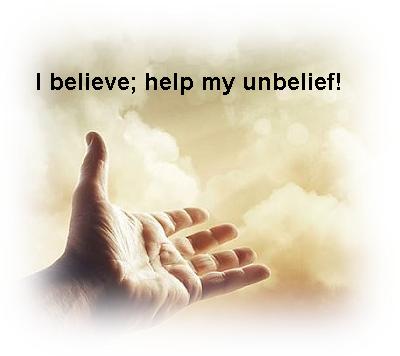Go to Jesus with Your Doubts!
Go to Jesus with Your Doubts!

There is no Christian who never doubts about God and faith. Some people find doubt positive, and find it suspicious when someone says that he is sure about something. Yet the Bible often talks about the certainty of faith.
That gives the impression that you should not doubt. But what do you do when you nevertheless doubt? Sometimes, or maybe often?
Besides texts about certainty (for instance, Rom. 8:35–38; James 1) there are also quite a few examples in the Bible about people who doubt (once in a while). Thomas is such an example (John 20:27). But also people like Abraham, Moses, and David. Abraham is called “the father of all believers”; he is in that respect an example for other people. But he too did doubt God's promises sometimes. For instance, his promised son. Yes, if you have to wait twenty-five years for it, then you are going to doubt. Abraham thought: that will not happen anymore. And after consulting his wife Sarah he went to bed with her slave. But God said, “No, that is not what I promised. You and Sarah will get a son.” And they got him too!
You can believe God on his Word. You can trust Him. But how difficult it is sometimes!
Mind, Emotion, Choose⤒🔗
In my congregation I come across all kinds of doubts. Whom do you believe, the Bible or science? Did God really create all living creatures in six days? Or was it a process of millions of years? And is the Bible for sure the Word of God? The Bible is written by people, is it not? And then the contradictions that seem to be there in the Bible? How do you know for sure that God really exists? No one can prove that. These kinds of questions are sometimes called doubts of the mind. You cannot understand it, not prove it. Some things appear to be neither logical nor honest. Or in conflict with one another.
There is also a kind of doubt that has more to do with feelings. If God exists, then should you notice something from him, experience something? If the Holy Spirit lives in you, then that is something special, is it not? Aren’t you supposed to feel it in some way? A feeling of warmth, happiness, affection, love. And to be filled with it. And if you do not have that, do you then really believe?
Nowadays there is often much emphasis put on that. But we also have to realize: there are differences in people. Not everyone is an emotional person. Believing is something that has to do with both mind and heart. But we do not all experience loving God in the same way, and it does not feel the same all the time.
What I often see with young people (but sometimes also with older people) is that you do not really want to choose. There is a certain resistance, something that holds you back to really surrender to God. Because you know that it has consequences. Because then you have to change your attitude or your way of life. Maybe you have to give up something. Then you halt between two opinions. Or you want to have it both ways. Then, one day you have to make a decision: positively choose for God and follow Jesus Christ. Because you know that you cannot do without him.

Doubt or Unbelief?←⤒🔗
A well-known Bible text that is often used in connection with doubt is Mark 9:24: “I believe; help my unbelief!” Is that text really about doubt?
Jesus with three disciples comes back from the mountain on which Moses and Elijah appeared to them. They find the other disciples in discussion with a large group of people, among them scribes. The reason was a father with a sick son. That boy had many problems. But the cause is an evil spirit. The desperate father brings his son to the disciples: “Help us!” Regrettably, they cannot do anything…
But surely Jesus had given them authority to cast out demons (Mark 3:15; 6:7)? And they had done it (Mark 6:13ff.)! Why did it work then and not now?
The scribes were very eager to find out: “You see, your power is after all also limited. And that Jesus you follow cannot do everything either.” Yes, this is the way they will have tried it: in Jesus’ name. But now they stand there not knowing what to say. Not exactly an example of strong faith.
But the father, he did believe, did he not? Why did he not go to Jesus before? His son was already demon possessed since his youth. And Jesus had already been in Galilee several times. He had already performed many healing miracles. Also healings from evil spirits. It looks more like an act out of desperation than an act of faith from this father. Not for nothing, Jesus sighs, “O faithless generation, how long am I to be with you? How long am I to bear with you?” (Mark 9:19). That does not sound very pastoral. More like being angry. At all of them. The scribes, who did not want to believe. The disciples, who had such little faith. And the father, somewhere in between. Jesus also involves the bystanders in it (verse 25). Thus, it is here not only about disbelief, but also about all kinds of doubts.
Everything Is Possible←⤒🔗
Jesus first talks to the father. And the father finishes his story with: “If you can do anything, have compassion on us and help us” (verse 22). This shows the doubt of the father. Jesus therefore rightly points out to him: things are the other way around. The real question is if the father can do something. Namely: believing! In Nazareth Jesus could not perform many miracles, not because God's power fell short, but because the people did not believe in Jesus (Mark 6:6). Everything is possible for those who believe, Jesus says. That does not mean that believers, then, can do everything. But that God, then, does everything for them. They may expect everything from God. Also the greatest miracles.
When Jesus talks to the father this way, then something breaks in that man. He cries out, “I believe; help my unbelief!” (verse 24). Thus, this is the moment at which faith breaks through. And that coming to faith is a greater and more important miracle than the healing of the boy. A double victory over Satan. In this way Jesus wants to move all bystanders to believe. To help them further. Through showing them God's power and his affection to all these people.
The disciples too are being helped. “Why could we not do this?” “You have to pray!” The disciples had driven out evil spirits before. But at a certain moment they thought that they could do it. Like a kind of a trick. But they had to keep praying. And expect it from God.

Surrender←⤒🔗
Our faith is not perfect. But fortunately, a small beginning of faith is sufficient for Jesus to perform a miracle. As this man went to Jesus and was helped by him, so we also may go to God. With all our questions and doubts. It is about surrender. To admit that you cannot do it yourself. Then there comes room to learn to trust God. And then that trust can also grow. Because God wants to give support and certainty. Not everyone has the same strong faith. The Spirit gives faith also in different measures (1 Cor. 12:7). And with one person it grows faster than with another. But all that is not decisive anymore. As long as you go to God with it: praying, listening (to the Bible), and expecting. And talking about it with others. Also about your doubts. Because you are not the only one who doubts (once in a while). God deals with everyone in a different way. One day God will completely deliver us, also from all doubts and little faith.

Add new comment